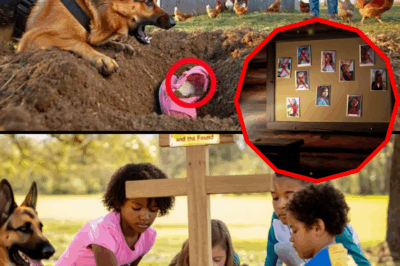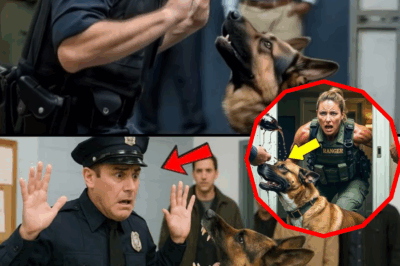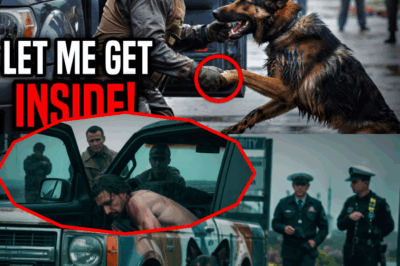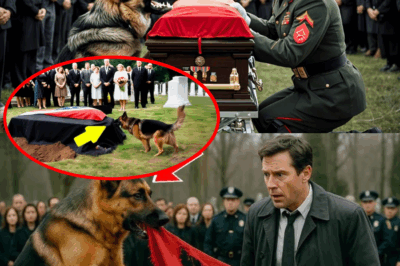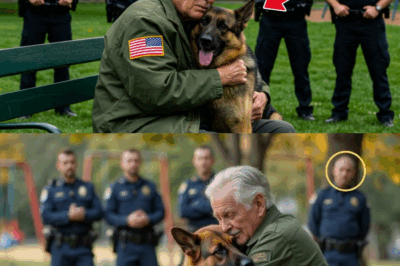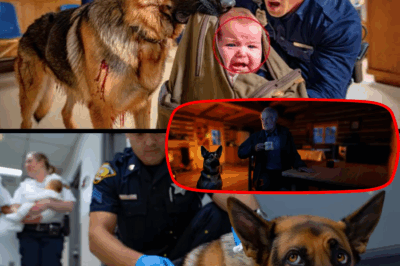No One Wanted This Senior Dog—Until a Kind Man Walked In and Changed His Life Forever”
Harold Whitaker hadn’t planned to wake up early that morning. Since he lost Marlene, his wife of forty-two years, he’d stopped planning anything at all. The man who once spent mornings building birdhouses in his Vermont workshop and evenings laughing over Marlene’s sunflower paintings, now found life dulled to routines that hurt more than they helped. Coffee at 6:00, mail at 10:00, soup at 6:00 again—time measured only by its emptiness.
It was the silence that finally got to him. On a day where the Vermont air hinted at coming spring, Harold pulled on the same coat he wore to Marlene’s funeral, grabbed his keys, and drove with no destination. He ended up in the gravel lot of Maple Ridge Rescue, an old barn that now housed dogs and, he suspected, ghosts of other peoples’ regrets.

Inside, the shelter was loud—barking, yelping, paws raking metal. Harold kept moving through the chaos, numbly, until he reached the back corner and saw a shape curled tight—a German Shepherd, old and thin, so still he seemed part of the shadows. The sign said “Gus. Senior. Arthritis. Low Activity.” Gus didn’t look up. Dull eyes half-shut, ribcage rising and falling, he seemed as fragile as Harold felt.
Harold sat on the bench in front of the kennel. He didn’t know why. For twenty minutes, neither man nor dog moved. No wag, no bark, no words. Just the low hum of existence. They were strangers, yet not. Two survivors, quietly bruised.

A volunteer passed by, whispered, “No one’s asked about him in weeks. He’s sweet—just shut down.” Harold said nothing. He felt the brittleness beneath Gus’s stillness. Not anger, not fear, just bone-deep tiredness, and the ache of being left behind by life itself. For a moment, Harold saw himself reflected in those distant brown eyes—two beings, out of hope but not finished.
He left that day. But that night, Harold found himself haunted by the dog in the shadows. Insomnia pressed harder than ever, and by morning, curiosity—or perhaps the faintest spark of purpose—pulled him back. This time, when Gus looked at him, something changed. The Shepherd shifted, ever so slightly, and rested his chin near Harold’s foot—not on it, not fully trusting, but not pulling away either.
“He hasn’t done that in a month,” a volunteer whispered, stunned.
For the first time since Marlene’s passing, Harold’s heart flickered, not with warmth but the ache of recognition. When you have lost everything, connection can hide in silence. Over several days, Harold returned to the shelter, each time bringing nothing but his quiet company, sitting on the splintery bench and simply being with Gus in the silent places pain had carved out for them.
Then, one cold morning, after pouring two coffees and remembering there was no one left to share, Harold decided: Gus was coming home.
The adoption was unremarkable on paper—just forms, a nervous old dog, and a retired man with trembling hands. When Gus limped out, he paused, looking up at Harold as if to ask: “Will you give up if I don’t?” Neither did.
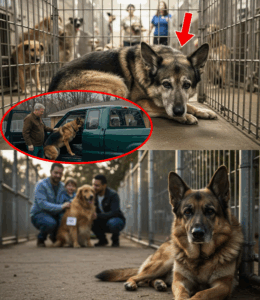
The house—once only echo and memory—shifted. Gus didn’t explore. He moved slowly, head low, glancing at Harold before settling by his feet. They learned each other’s scars in subtle ways: the way Gus refused to eat unless Harold was close, the coffee cup left across the table like a memorial, the silence becoming something gentle instead of terrorizing.
Weeks passed. Morning walks began—slow, creaking with held breath and cautious hope. Vermont’s wild trails stretched before them, both making peace with sore bodies and ancient heartaches. Harold would pause on a log, Gus leaning in, shoulder to thigh—a wordless reminder that comfort sometimes means simply not being alone.
Then, winter struck back with a vengeance.
Full video :
News
A Single Bark That Changed Everything: The Incredible True Story of a German Shepherd Who Unmasked a Hometown Serial Predator, Plunged a Quiet County into Nightmares, and Proved Some Heroes Will Risk It All to Protect the Innocent—Even When Evil Stares Back from the Darkness.
The Untold Story: How One Dog’s Loyalty Unmasked A Predator and Changed a Town Forever If not for Rocky’s bark…
Exposing the Unthinkable: K9 Hero Dog Uncovers Deadly Secret Agent Masquerading as Top Police Officer, Thrusting Entire Department into Heart-Stopping Conspiracy That Could Destroy Lives! Could Your Colleagues Be Impostors Too? Find Out What Shadow the Dog Saw That No Human Could Detect Before It Was Too Late!
K9 Hero Dog Detects Impostor in the Police Department — A Thrilling True Tale of Loyalty, Betrayal, and Instinct The…
A Missing Navy SEAL K9 Guarded a Mysterious Truck for Hours—When Commanders Forced Open the Door, What They Found Shattered Military Protocol and Exposed a Shocking Conspiracy That Had Haunted the Base for 18 Months, Sending Shockwaves Through the Special Operations Community and Changing History Forever.
K9 Dog Refused to Let the Navy SEAL Open His Truck Door—What Was Inside Made the Commander Step Back There…
Funeral Mayhem as German Shepherd Attacks Police Chief’s Casket—Dog Uncovers Shocking Secret, Forces Authorities to Exhume Coffin, Revealing Chief Still Breathing After Alleged Death, Setting Off Frenzied Hunt for a Would-Be Killer Among Trusted Colleagues, and Exposing an Explosive Scandal Shaking Local Government!
Article: The Dog That Wouldn’t Stop Barking – How Max Saved Chief Harrison, Unmasked a Conspiracy, and Shocked a Town…
Heroic War Dog Defies Police Orders and Recognizes His True Master After Thirty Years—Triggering a Midnight Siege, a Government Cover-Up, and a Fight to Protect a Bond Written in Blood and Battle!
A K9 Dog Was Ordered to Attack an Old Man — But What Happened Next Left Everyone in Tears! On…
A Bloodied K9 Staggers to Police in the Storm, Dragging a Backpack—When Officers Opened It, the Heart-Stopping Secret Inside Sparked a Shocking Town-Wide Mystery That Would Shake Communities, Expose Terrible Secrets, and Change the Lives of a Lost Child, a Fallen Hero, and an Entire Town Forever.
Wounded K9 Drags Backpack to Police — The Miracle and the Mystery That Changed Everything Thunder cracked over Cedar Grove…
End of content
No more pages to load

